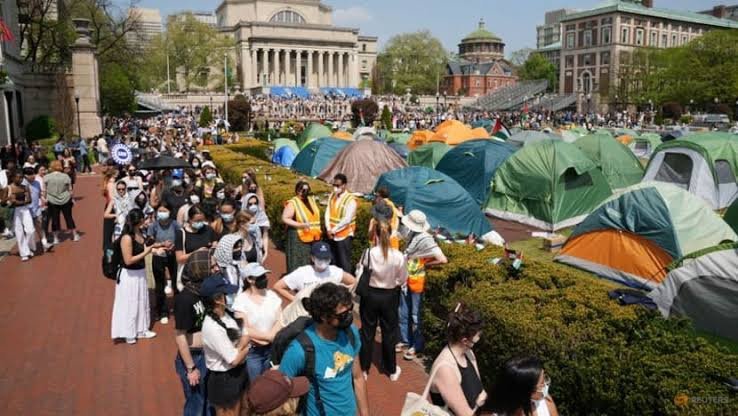Columbia University has suspended pro-Palestinian student activists who refused to disband their protest camp on the New York City campus. This decision came after the Ivy League institution declared a deadlock in negotiations aimed at ending the demonstration, which has caused significant controversy.
University President Nemat Minouche Shafik stated that the university’s efforts to reach a compromise with student organizers were unsuccessful. Despite several days of talks, demonstrators refused to take down the numerous tents erected to protest against Israel’s actions in Gaza.
The crackdown at Columbia, at the center of Gaza-related protests roiling university campuses across the U.S. in recent weeks, occurred as police at the University of Texas at Austin arrested dozens of students whom they doused with pepper spray at a pro-Palestinian rally.
Columbia sent a letter on Monday morning warning that students who did not vacate the encampment by 2 p.m. ET and sign a form promising to abide by university policies would face suspension and become ineligible to complete the semester in good standing.
“We have begun suspending students as part of this next phase of our efforts to ensure safety on our campus,” said Ben Chang, a university spokesperson, at a briefing on Monday evening.
“The encampment has created an unwelcoming environment for many of our Jewish students and faculty and a noisy distraction that interferes with the teaching, learning and preparing for final exams,” Chang said.
Earlier, Shafik said Columbia would not divest from finances in Israel, a key demand of the protesters. Instead, she offered to invest in health and education in Gaza and make Columbia’s direct investment holdings more transparent.
Protesters have vowed to keep their encampment on the Manhattan campus until Columbia meets three demands: divestment, transparency in university finances, and amnesty for students and faculty disciplined for their part in the protests.
“These repulsive scare tactics mean nothing compared to the deaths of over 34,000 Palestinians. We will not move until Columbia meets our demands or we are moved by force,” leaders of the Columbia Student Apartheid Divest coalition said in a statement read at a news conference following the deadline.
Hundreds of demonstrators, many wearing traditional Palestinian keffiyeh scarves, marched around the perimeter of the encampment chanting, “Disclose! Divest! We will not stop, we will not rest.”
Shafik faced an outcry from many students, faculty and outside observers for summoning New York City police two weeks ago to clear the protest camp.
After more than 100 arrests were made, students restored the encampment on a hedge-lined lawn of the university grounds within days of the April 18 police action.
Since then, students at dozens of campuses from California to New England have set up similar encampments to demonstrate their anger over the Israeli operation in Gaza and the perceived complicity of their schools in it.
The pro-Palestinian rallies have sparked intense campus debate over where school officials should draw the line between freedom of expression and hate speech
Students protesting Israel’s military offensive in Gaza, including some Jewish peace activists, have said they are being censured as antisemitic merely for criticizing the Israeli government or for expressing support for Palestinian rights.
Other Jewish groups counter that anti-Israel rhetoric frequently delves into or feeds overt forms of anti-Jewish hatred and calls for violence, and thus should not be tolerated.
Such reasoning was brought to bear by groups that pressured the University of Southern California two weeks ago to cancel the graduation speech of its class valedictorian, Asna Tabassum, a Muslim student, over her perceived pro-Palestinian views.
The Los Angeles-based university later announced it was canceling the entire main-stage commencement ceremony for its May 10 graduation.
On Monday, the head of the Los Angeles Urban Policy Roundtable, Earl Ofari Hutchinson, called on USC President Carol Folt to convene an “emergency campus student-administration dialogue” to diffuse tensions on campus.
STUDENT PROTESTS ABOUND
Across town at the University of California, Los Angeles (UCLA), where opposing sides clashed over the weekend, pro-Israeli activists set up a large screen and loudspeakers to play a taped loop of images from the Oct. 7 Hamas attack on Israel. The video appeared aimed at countering pro-Hamas chants that seeped into campus protests in support of Palestinian civilians besieged in Gaza.
UCLA also stepped up security around the pro-Palestinian encampment there, consisting of more than 50 tents surrounded by metal fencing near the main administration building on campus.
Civil rights groups have criticized law enforcement tactics on some campuses, such as Atlanta’s Emory University and the University of Texas at Austin, where police in riot gear and on horseback moved against protesters last week, taking dozens into custody before charges were dropped for lack of probable cause.
Protests, and arrests, flared anew on the Austin campus on Monday.
Campus police backed by Texas state troopers attempted to break up a large student protest using pepper spray and flash-bang charges, arresting at least 43 people, according to defense attorney George Lobb, who said he confirmed the number with court and jail staff processing the detentions.
Video posted on social media showed police pulling individual students from a gathering on a grassy area where demonstrators sat and locked arms, some of them shouting, “Let them go!”
At Virginia Commonwealth University in Richmond, police and protesters clashed as officers moved in after nightfall to break up an encampment. Local TV aired video of police in riot gear dousing demonstrators, many of whom the university said were not students, with what appeared to be pepper spray, and making arrests.
Some 150 miles to the west, officials at Virginia Tech said on Monday that 91 protesters arrested on Sunday night at a student-led encampment had been charged with trespassing. Video posted on social media showed demonstrators chanting, “Shame on you” as some were taken into custody.
